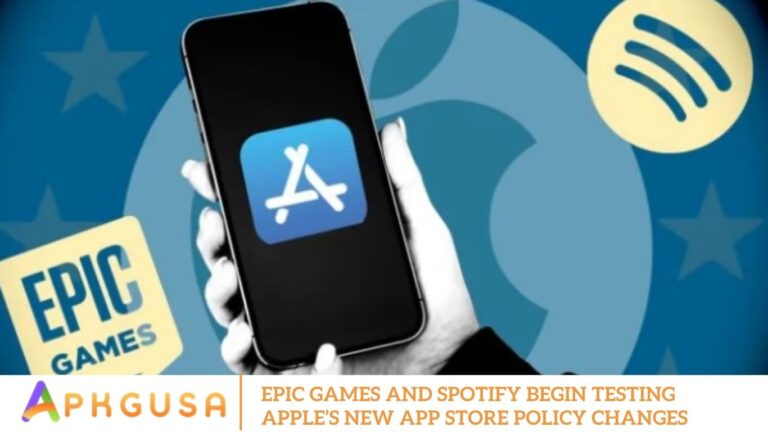Epic Games and music streaming giant Spotify are now testing Apple’s newly updated App Store policies changes that could significantly alter how apps operate on iOS. On Friday, both companies submitted revised versions of their apps to Apple’s App Review, marking a pivotal shift in how developers interact with the App Store ecosystem.
For Epic Games, this move signals a potential return of Fortnite to the App Store after a prolonged absence. Apple removed the popular battle royale game in 2020 and terminated Epic’s developer account after the company implemented direct payment options a direct violation of Apple’s policies at the time leading to a high-profile antitrust lawsuit.
Epic Games and Spotify Are Leading the Way
Epic Games: A History of Conflict
Epic Games has been at the forefront of the anti-Apple movement since it launched a legal battle in 2020 over the 30% App Store commission. The Fortnite maker argued that Apple’s policies were anti-competitive and stifled innovation. Although the legal outcome was mixed, it sparked global scrutiny of Apple’s practices.
Now, Epic is among the first companies to test Apple’s new App Store policies. The company recently relaunched its Epic Games Store on iOS in the EU, offering users access to apps and games via a third-party store a move that was previously impossible.
Spotify: Advocating for Fair Competition
Spotify, another long-time critic of Apple, has argued for years that the App Store creates an unfair playing field for competing music services. Apple’s control of the payment system made it difficult for Spotify to offer competitive pricing compared to Apple Music.
With the new changes, Spotify is now testing external subscription links, allowing users to subscribe to Spotify Premium directly through their website instead of through Apple’s in-app payment system. This bypass reduces the fees paid to Apple and gives Spotify more control over its revenue.
Meanwhile, Spotify aims to enhance user experience by introducing in-app audiobook purchases. Under the new policy, Spotify plans to allow users to buy individual audiobooks and let Premium subscribers purchase additional “top-up” hours once they exceed their monthly 15-hour free listening limit.
Spotify’s latest move follows Apple’s approval of the Amazon Kindle app’s “Buy Book” button, a first for the eBook platform. It also comes just a week after Spotify gained Apple’s approval to display subscription pricing directly within its U.S. streaming app previously a significant limitation.
These developments suggest that more developers could soon follow Epic and Spotify’s lead as Apple’s App Store policy changes begin to unlock new business opportunities.
Although these changes offer greater freedom for large platforms, they may be even more significant for independent developers, as they eliminate long-standing roadblocks and enable alternative monetization models.
The policy shift stems from Apple’s recent loss in its legal battle with Epic Games. While the court essentially ruled in Apple’s favor, the judge found the company had failed to comply with orders related to in-app payment alternatives. As a result, Apple was compelled to loosen restrictions that previously forced developers to request permission to link out to their websites and use carefully controlled messaging often referred to as “scare screens” to warn users about making purchases outside the App Store.
Previously, Apple charged a 27% commission on web-based sales, down slightly from its usual 30%. However, under the judge’s latest ruling, Apple must now allow developers to link freely to external payment platforms without added commission fees or formatting requirements.
For tech companies and small developers alike, this could mark a turning point in the long-standing debate over Apple’s App Store control and in-app purchase policies.
Frequently Asked Questions
What are Apple’s new App Store policy changes?
Apple’s new policies allow developers to link to external payment systems, reduce commission fees under certain conditions, and enable third-party app stores (in the EU only). These changes aim to comply with new global regulations like the EU’s Digital Markets Act (DMA).
Why are Epic Games and Spotify involved in testing these changes?
Epic Games and Spotify have been vocal critics of Apple’s App Store rules. They are now among the first major companies to test the new policies Epic with its game store on iOS (in the EU) and Spotify with external payment links for subscriptions.
What is the Digital Markets Act (DMA), and how does it relate to this?
The DMA is an EU regulation designed to increase competition in digital markets. It classifies Apple as a “gatekeeper” and forces it to allow third-party app stores and alternative payment methods, prompting the recent policy changes.
Can all developers use external payment links in their apps now?
Due to legal pressure, this feature is being rolled out gradually and is more widely available in the EU. Developers must apply and meet Apple’s design and security requirements to include external links.
How do these changes benefit consumers?
Consumers may see lower prices, more payment options, and access to apps from third-party stores. They will also be able to pay directly through a developer’s website, bypassing Apple’s in-app system.
Are there any risks for users with third-party payment systems?
Yes. Since payments occur outside of Apple’s ecosystem, Apple won’t handle billing issues or refunds. Consumers will need to trust the developer’s payment systems and customer support.
Conclusion
Epic Games and Spotify’s early adoption of Apple’s new App Store policy changes marks a significant moment in the evolution of mobile app marketplaces. While the full impact remains to be seen, one thing is clear: the balance of power in the app economy is beginning to shift.
For developers, it opens new avenues for monetization and user engagement. For consumers, it promises more choice and potentially better value. And for Apple, it signals the start of a new chapter one in which it must adapt to a world that demands greater fairness, transparency, and flexibility.


